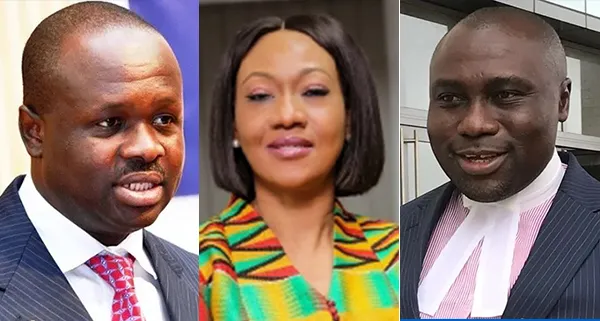NDC Election Director Justifies Calls for 2024 EC Register Forensic Audit
Among the critical observations made is the illegal addition of 243,540 previously transferred voters to the 2024 transfers.
- Advertisement -
The Director of Elections for the opposition National Democratic Congress (NDC), Dr. Edward Kofi Omane Boamah, has outlined six reasons why a forensic audit of the 2024 voter register is necessary.
Among the critical observations made is the illegal addition of 243,540 previously transferred voters to the 2024 transfers.
- Advertisement -
Dr. Omane Boamah also highlighted key concerns, including system manipulation, vulnerabilities, delays in providing the provisional register, the impact of errors on the elections, historical comparisons, and the timeline for correcting these issues. He stressed that names had been illegally transferred repeatedly, which raises further questions about the integrity of the register.
- Advertisement -
However, the Electoral Commission (EC) and the governing New Patriotic Party (NPP) rejected these calls. Evans Nimako, the NPP’s Director of Elections, dismissed the NDC’s concerns, arguing that the party’s stance suggests they are not prepared for the upcoming elections.
Key Issues Raised by the NDC:
- Unidentifiable Transfers: Over 15,000 voter transfers were untraceable, raising concerns about fake voter registrations and the original locations of these voters.
- Voter Deletions: 3,957 voters, registered in 2023, were deleted from the 2024 provisional register due to transfers, without clear justification.
- Absent Voter List Issues: 2,094 voters were transferred to different polling stations but were not found in the Absent Voter List as required by law.
- Corrupt Files: Files showing names and photos of registered voters were corrupted, raising fears of further issues on election day.
The NDC held an emergency meeting with the EC in Accra to address these discrepancies, but the EC rejected their request for a forensic audit. Dr. Omane Boamah expressed concern that the same institution responsible for the irregularities should not be solely responsible for resolving them. He called for an independent body to handle the audit and noted that international organizations like the UNDP were ready to support this process if the EC requested their involvement.
“This is not the first time I’ve suggested this at IPAC meetings,” Dr. Omane Boamah stated. “Development partners are ready to assist, and the NDC is also capable of helping. Unfortunately, the Electoral Commission has not accepted this.”
Dr. Boamah compared the situation to the healthcare sector, where issues are referred to specialists. He emphasized that the EC’s refusal to allow a forensic audit raises further doubts about their transparency, and if they have nothing to hide, they should welcome such scrutiny.
NPP’s Response
- Advertisement -
Evans Nimako, the NPP’s Director of Elections, responded by claiming that the NDC’s demand for a forensic audit was simply an excuse to hide their lack of preparedness for the upcoming elections. He stated that the register is credible and that the NDC’s claims are insufficient to warrant a forensic audit.
“The revised strategy of the NDC will not work,” Nimako said in an interview on Joy FM. “They are trying to set the agenda, but the register is credible and can be used for free and fair elections. This demand shows that the NDC is not ready for the elections.”
NDC’s Key Observations
Dr. Omane Boamah provided a detailed write-up of the NDC’s reasons for demanding a forensic audit. Below are the key points raised:
- Extent of Manipulation: The scale of illegal voter transfers, such as the transfer of voters from Tamale South Constituency by the Pusiga EC Office without proper authorization, must be investigated. How widespread are these incidents, and how many voters have been affected?
- System Vulnerabilities: The EC’s systems, both human and technical, were clearly vulnerable to unauthorized transfers. What security measures were bypassed or ignored, and what steps are being taken to prevent further manipulations before the December 7 elections?
- Timeliness of the Provisional Register: There was an unnecessary delay in providing the NDC with the provisional register. Why did this happen, and what steps will the EC take to prevent future delays?
- Impact of Mistakes on the Elections: The EC has admitted to making mistakes. What is the potential impact of these errors on the fairness of the upcoming elections, and could they compromise the election results?
- Historical Comparisons: The EC has referenced mistakes made by previous commissions. What lessons have been learned from these errors, and how can they help prevent similar issues in the future?
- Timeline for Corrections: What is the timeline for addressing these issues to ensure a reliable, accurate, and fit-for-purpose voter register before the election materials are printed and distributed, as agreed upon at IPAC?
Why a Forensic Audit is Needed
The NDC believes that a forensic audit will help address these questions and restore public confidence in the electoral process. The party argues that addressing these concerns transparently is essential for maintaining trust in Ghana’s democracy. A forensic audit would also help assure voters that the election will be free, fair, and transparent.
The NDC also called for a five-day re-exhibition of the register after the forensic audit to allow voters to verify the accuracy and integrity of the register. Dr. Omane Boamah urged the EC to convene an emergency meeting with all political parties, civil society organizations, and development partners—including ECOWAS, the AU, UNDP, EU, USAID, DANIDA, and the British High Commission—to discuss these critical issues and proceed with the forensic audit.
Dr. Omane Boamah emphasized that the NDC’s criticisms are not meant to undermine the Electoral Commission, but to ensure accountability and the integrity of Ghana’s democracy. The NDC is calling on the EC to uphold the highest standards of fairness, neutrality, and transparency in the upcoming 2024 elections. The credibility of Ghana’s electoral process, they argue, hinges on the integrity of the institutions responsible for overseeing it.
Source:expressnewsghana.com
- Advertisement -


